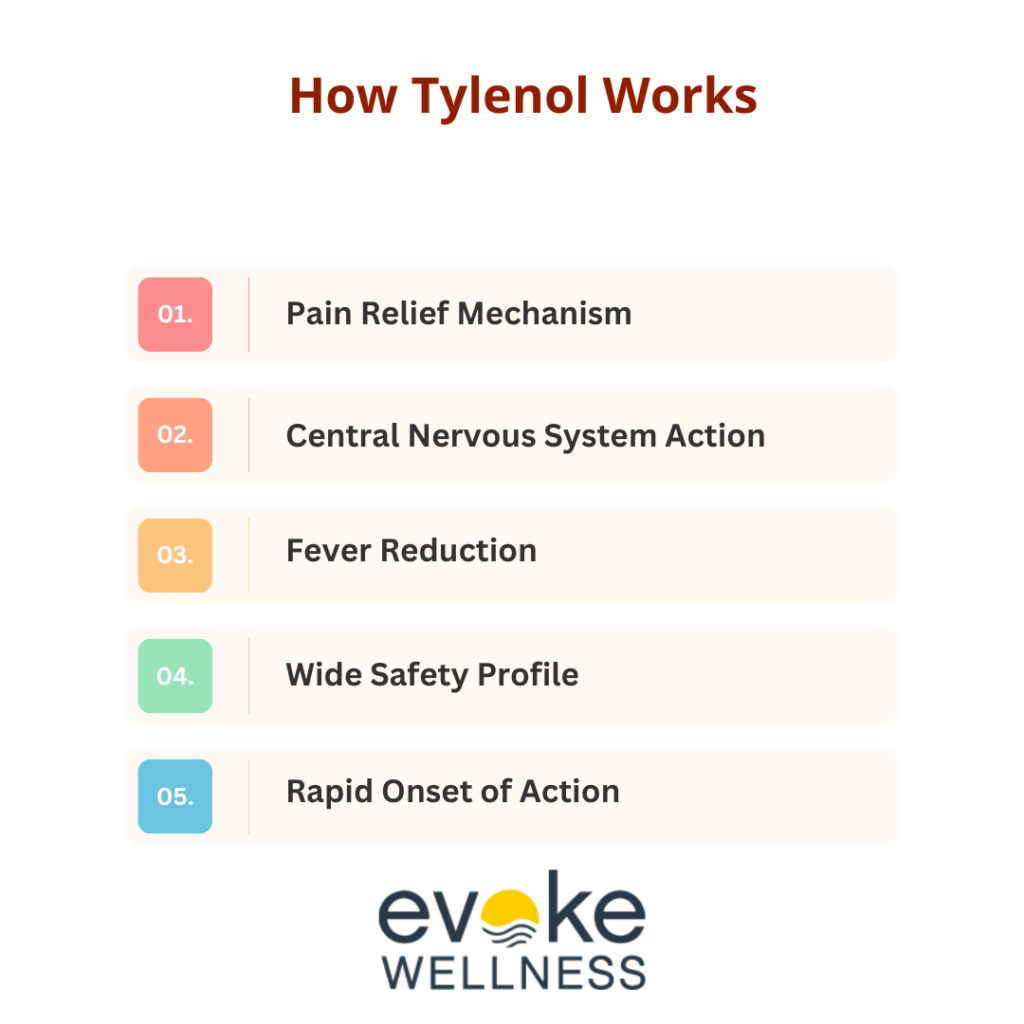What is Tylenol?
Tylenol is a widely used over-the-counter medication that contains acetaminophen as its active ingredient. It is primarily used to relieve pain and reduce fever. Tylenol is available in various forms, including tablets, capsules, liquid suspensions, and chewable tablets, making it accessible for both adults and children. As a non-opioid analgesic, Tylenol is often preferred for managing mild to moderate pain, such as headaches, muscle aches, arthritis, and menstrual cramps, due to its effectiveness and lower risk of dependency compared to opioid pain relievers.
It is commonly utilized for conditions such as:
- Headaches: Whether tension-related or migraine, Tylenol can help provide relief.
- Muscle aches: Useful after physical exertion or due to chronic conditions.
- Arthritis: Often recommended to manage pain associated with osteoarthritis or rheumatoid arthritis.
- Back pain: Frequently used for acute and chronic back discomfort.
- Toothaches: Helpful in managing dental pain.
- Cold and flu symptoms: Reduces fever and alleviates body aches during viral infections.
Unlike nonsteroidal anti-inflammatory drugs (NSAIDs), Tylenol does not possess anti-inflammatory properties, making it a preferred choice for those who cannot tolerate NSAIDs due to gastrointestinal issues or other side effects.
How Tylenol Works
Tylenol works by inhibiting the production of prostaglandins, which are chemicals in the body responsible for pain and inflammation. It achieves this primarily in the brain, leading to a reduction in the perception of pain and lowering of fever. Unlike nonsteroidal anti-inflammatory drugs (NSAIDs) such as ibuprofen or aspirin, Tylenol does not have significant anti-inflammatory properties, making it a suitable option for individuals who may be sensitive to NSAIDs or have conditions that contraindicate their use.
Acetaminophen operates through several mechanisms:
- Central Nervous System Effect: It primarily acts on the central nervous system (CNS) to elevate pain thresholds. By inhibiting the production of prostaglandins, which are substances that promote pain and fever, Tylenol effectively reduces the perception of pain.
- Fever Regulation: Acetaminophen acts on the hypothalamus, the brain region responsible for regulating body temperature, helping to bring down fever effectively.
The drug is typically well-tolerated, with fewer gastrointestinal side effects than NSAIDs, making it suitable for long-term use in some individuals.
Tylenol and the Liver
Liver Metabolism of Tylenol
The liver is essential in metabolizing acetaminophen, converting it into non-toxic compounds that can be excreted. When Tylenol is consumed, it undergoes several metabolic processes:
- Conjugation: The majority of acetaminophen is conjugated with sulfate and glucuronide, creating non-toxic metabolites that are easily eliminated from the body through urine.
- Cytochrome P450 Pathway: A small fraction of acetaminophen (approximately 5-10%) is metabolized by cytochrome P450 enzymes into reactive intermediates. Under normal circumstances, these intermediates are detoxified by glutathione, a potent antioxidant produced in the liver.
Tylenol and Liver Toxicity
While acetaminophen is generally safe when taken as directed, excessive doses can overwhelm the liver’s capacity to metabolize it. When taken in doses exceeding the recommended guidelines, the following may occur:
- Decreased Glutathione Levels: An overdose can lead to a depletion of glutathione, which plays a crucial role in detoxifying reactive metabolites.
- Cellular Damage: The accumulation of toxic metabolites can cause cellular damage to the liver, leading to acute liver failure if untreated.
Symptoms of Liver Toxicity: Symptoms may not manifest immediately and can include:
- Early Symptoms: Nausea, vomiting, abdominal pain, and loss of appetite.
- Progressive Symptoms: After 24-48 hours, symptoms may escalate to jaundice (yellowing of the skin and eyes), confusion, and severe abdominal discomfort.
Understanding these risks is vital, especially for individuals with existing liver conditions or those consuming alcohol regularly.
Time Tylenol Stays in Your System
Determining Factors
The time Tylenol remains in your system can be influenced by various factors:
- Dosage: Higher doses take longer to clear from the body. For instance, while the recommended dose for adults is generally up to 1,000 mg every 4 to 6 hours, taking higher amounts increases the duration acetaminophen stays in the system.
- Age: Children metabolize medications differently than adults, and elderly individuals may experience a slower metabolism due to age-related liver function decline.
- Liver Health: Individuals with liver disease or conditions affecting liver function may experience delayed clearance of acetaminophen, increasing the risk of toxicity.
- Other Medications: Some drugs may affect how acetaminophen is metabolized. For example, certain medications that induce liver enzymes can lead to an increased production of toxic metabolites.
Acetaminophen typically has a half-life of approximately 1 to 4 hours in healthy adults. This means that it can take about 24 hours for the body to eliminate the drug entirely, depending on individual circumstances.
Effects of Overdose
Recognizing the signs of acetaminophen overdose is crucial for timely intervention. Potential effects of an overdose include:
- Initial Symptoms: Often mild and similar to those of common illnesses—nausea, vomiting, sweating, and abdominal pain—may initially be overlooked.
- Severe Symptoms: After a day or two, more severe symptoms can emerge, including confusion, jaundice, and abdominal pain. Late-stage symptoms indicate significant liver damage and require immediate medical attention.
- Acute Liver Failure: In extreme cases, acetaminophen overdose can lead to acute liver failure, necessitating hospitalization and potentially a liver transplant.
Drinking Alcohol After Taking Tylenol
Risks of Mixing Alcohol and Tylenol
Combining alcohol and acetaminophen poses substantial risks, particularly concerning liver health. Both substances are metabolized by the liver, and their concurrent use can lead to:
- Increased Risk of Liver Damage: Alcohol consumption depletes glutathione levels, which increases the likelihood of toxic metabolite accumulation when acetaminophen is also present.
- Higher Overdose Risk: Individuals may unintentionally take excessive amounts of acetaminophen while underestimating their alcohol consumption, leading to a dangerous overdose scenario.
Healthcare providers frequently advise against the use of alcohol while taking acetaminophen to mitigate these risks.
Safe Time Frame for Alcohol Consumption
To minimize the risk of liver damage, it is generally advisable to wait at least 24 hours after taking Tylenol before consuming alcohol. However, individual circumstances may vary:
- Acetaminophen Dosage: Higher doses necessitate longer waiting periods. For instance, if someone has taken more than the standard recommended dose, it may be wise to extend the wait period.
- Overall Health: Individuals with liver conditions or those taking other medications affecting liver function should consult with a healthcare professional about their alcohol consumption after taking acetaminophen.
Preventing Tylenol Overdose
To prevent acetaminophen overdose, it is essential to follow specific guidelines:
- Adhere to Recommended Dosages: Always follow the dosage instructions provided on the medication label or by your healthcare provider. Avoid exceeding the maximum daily limit of 4,000 mg for adults.
- Avoid Multiple Products: Be mindful when using other medications, especially over-the-counter remedies for cold, flu, or pain, as many contain acetaminophen.
- Educate Yourself: Understanding the signs of overdose and the importance of liver health can help individuals use Tylenol responsibly, particularly those with a history of alcohol use or liver problems.
- Use as Directed: Always read medication labels carefully and consult with a healthcare provider if unsure about the appropriateness of Tylenol for your condition.
Treating Tylenol Overdose
If an overdose is suspected, immediate medical attention is critical. Treatment options may include:
- Activated Charcoal: Administered within a few hours of ingestion, activated charcoal can absorb acetaminophen in the gastrointestinal tract, reducing the amount entering the bloodstream.
- N-acetylcysteine (NAC): NAC is an antidote that helps restore glutathione levels in the liver, mitigating damage. It is most effective when administered within 8 to 10 hours of acetaminophen ingestion but can still provide benefits if given later.
- Supportive Care: Hospitalization may be necessary for severe cases, involving intravenous fluids and monitoring liver function.
Conclusion
Understanding how long Tylenol (acetaminophen) remains in your system is essential for ensuring safe usage and preventing potential health risks. While Tylenol is an effective pain reliever and fever reducer, it is crucial to be aware of its effects on the liver and the dangers associated with overdose and mixing it with alcohol.
If you or someone you know is struggling with substance use or requires support in managing pain relief safely, consider seeking help from qualified professionals. At Evoke Wellness at San Marcos, we offer comprehensive Substance Abuse Treatment Programs, including Cognitive-Behavioral Therapy and Dual Diagnosis Treatment Programs designed to address both mental health and substance use disorders. Your health and well-being are our top priorities, and we’re here to support you on your journey to recovery. Together, let’s embrace the journey to recovery and the promise of a new beginning. Call us at (833) 503-0734 today or reach out online.
FAQ on How Long Does Tylenol Stay in Your System?
How long does Tylenol stay in your system?
Tylenol typically stays in your system for about 4 to 6 hours after ingestion. However, it can be detected in urine for up to 24 hours.
What factors affect how long Tylenol remains in the body?
Several factors can influence how long Tylenol stays in your system, including age, weight, liver function, dosage, and overall health.
What are the signs of a Tylenol overdose?
Symptoms of a Tylenol overdose may include nausea, vomiting, loss of appetite, confusion, jaundice (yellowing of the skin or eyes), and abdominal pain.
Can you drink alcohol after taking Tylenol?
It’s advisable to avoid alcohol after taking Tylenol, as both substances are processed by the liver, which can increase the risk of liver damage.
What should I do if I suspect a Tylenol overdose?
If you suspect an overdose, seek immediate medical attention or contact your local poison control center. Early intervention is critical for effective treatment.
How can I safely use Tylenol?
To use Tylenol safely, follow the recommended dosage on the packaging, avoid combining it with alcohol, and consult with a healthcare provider if you have pre-existing liver conditions or are taking other medications.



